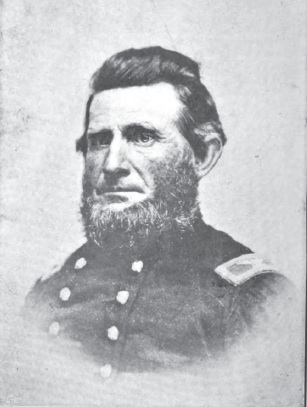MOGMBGrover
BENJAMIN WHITEMAN GROVER 1811-1861

Grand Master, 1851-1853
BIOGRAPHY
From Biographies of Past Grand Masters, 1821-1901, by the Grand Lodge of Missouri:
Most Worshipful Brother Benjamin Whiteman Grover appears to have entered the Grand Lodge for the first time at the Annual Communication of 1844, when he acted as Senior Grand Deacon pro tem. He again appeared in 1847. When the Annual Session was held in May, 1849, at Boonville, Missouri, he represented Heroine Lodge at Kansas City, which he had instituted. At that session he served as Senior Grand Deacon. At the following session in 1850 — also held in Boonville — he was elected Deputy Grand Master, and in 1851 was elected Most Worshipful Grand Master and re-elected in 1852, serving two terms. He was succeeded by Brother Wilson Brown.
Brother Grover was born in Xenia, Greene County, Ohio, October 21, 1811. His education was acquired in the schools of that day. He became Deputy Circuit Clerk under his father, who held that office in the county. Leaving Ohio he went to Madison, Indiana, in 1834, where he remained until 1842, when he removed to St. Louis, remaining but two years; he permanently settled at Warrensburg, Missouri.
In Masonry it appears he first became a Mason at the age of twenty-two in Madison, Indiana. While residing in St. Louis he affiliated with Naphtali No. 25; subsequently assisted in forming Johnson Lodge No. 85, at Warrensburg, which was set to work April 13, 1846. He settled at Warrensburg on a farm which became in later years a portion of the city. He was a leader and was soon recognized by election as Sheriff in 1848 and served until 1852, when he was elected to the State Senate, representing Johnson and Lafayette Counties, serving two terms. He was an avowed supporter of the locating of the Missouri Pacific Railroad through Johnson County, and through his influence the location was settled, for which the citizens of that county honored him with a testimonial. He was afterwards a director of the railroad company.
In the State Convention of 1861, assembled to determine as to the expediency of seceding from the Union, Brother Grover was elected Sergeant-at-Arms of that body. The Convention voted overwhelmingly to adhere to the Union. War soon followed; Brother Grover enlisted; was commissioned March 5, 1861, Lieutenant Colonel; he organized a regiment of Home Guards — afterwards the 27th Mounted Infantry, Missouri Volunteers. The enemies of the course pursued, endeavored to capture him, and offered a large reward to any one who would kill him.
First of May, 1861, his regiment was called into State service and he was on two occasions elected Colonel, which he declined. August following, his regiment arrived at Jefferson City, from which it was ordered to Lexington, Missouri, where it participated in the battles and siege of that city, under command of General Mulligan, and lasting from September 12th to the 20th.
On the 19th of September, Colonel Grover was wounded, his right thigh being broken by a rifle ball. After the surrender of Lexington by General Mulligan to the Confederate General, Price, Colonel Grover was paroled and was removed by boat to St. Louis, where he died October 30, 1861. His remains lie in Bellefontaine Cemetery. Post No. 78, Grand Army of the Republic, at Warrensburg, Missouri, is named Grover in his honor. Although an humble testimonial, assuredly a deserving tribute to patriotic courage and devotion.
From Missouri Lodge of Research:
Grand Master Grover was born in Xenia, Greene County Ohio, October 27, 1811.
Benjamin Grover received the degree of Masonry in Union Lodge No 2, Madison Ind. in 1838. In 1842 he moved to St Louis and brought his membership with him and joined Naphtali Lodge No 25.
He was a member of the Whig Party and a supporter of Henry Clay. From 1844 to 1848 he operated a merchandise business in the City of Warrensburg. He reorganized the school system in Warrensburg.
He was elected to the State Senate in 1852. He was an advocate of the railroads and offered legislation amending the charters of the Pacific railroad, the North Missouri railroad, the Iron Mountain , the Platte County, and the Hannibal and St Joseph railroads aiding their developement.
He was always and enthusiastic Mason first appearing at a Grand Lodge communication in 1844. He was elected Grand Master in 1851 and 1852,
He fought in the Battle of Lexington on the grounds of the Masonic college and was wounded September 19, 1861 and was taken to St Louis to the home of Past Grand Master Joseph Foster where he died October 30, 1861. He was buried with military honors in the City of St Louis in Bellefontaine Cemetery October 31, 1861. He remains were moved to the Grand Lodge lot in St Louis and ins 1883 his body was re-interred in the family lot in Warrensburg.